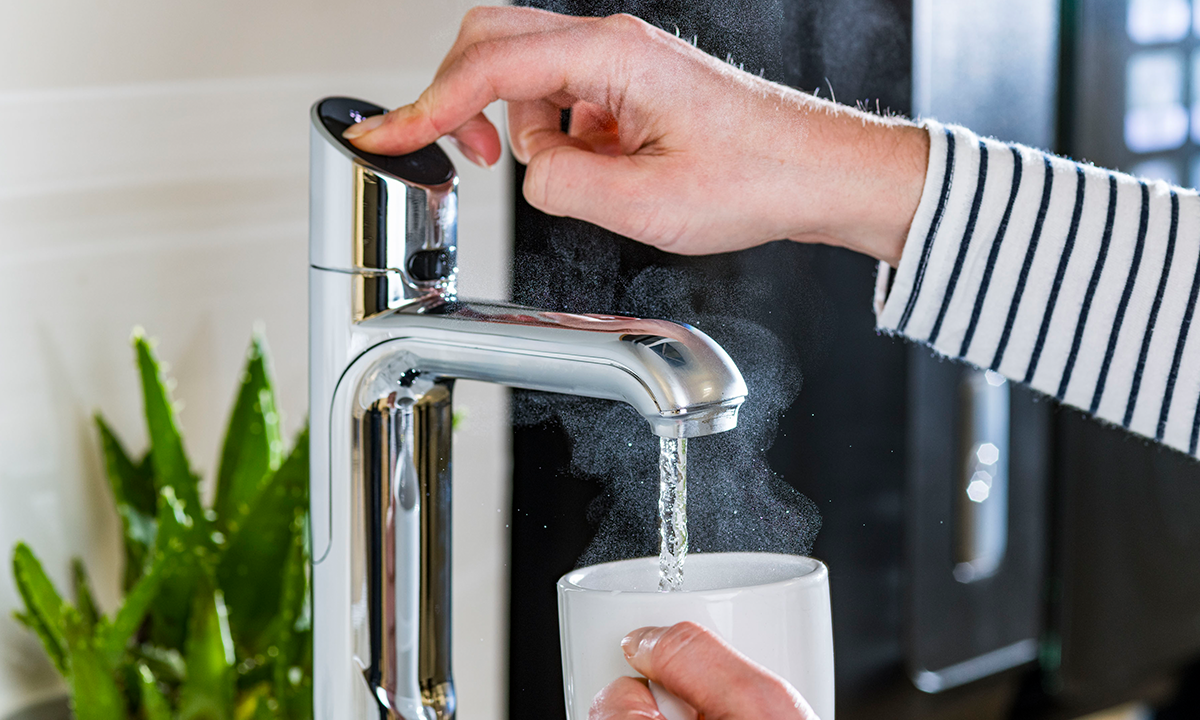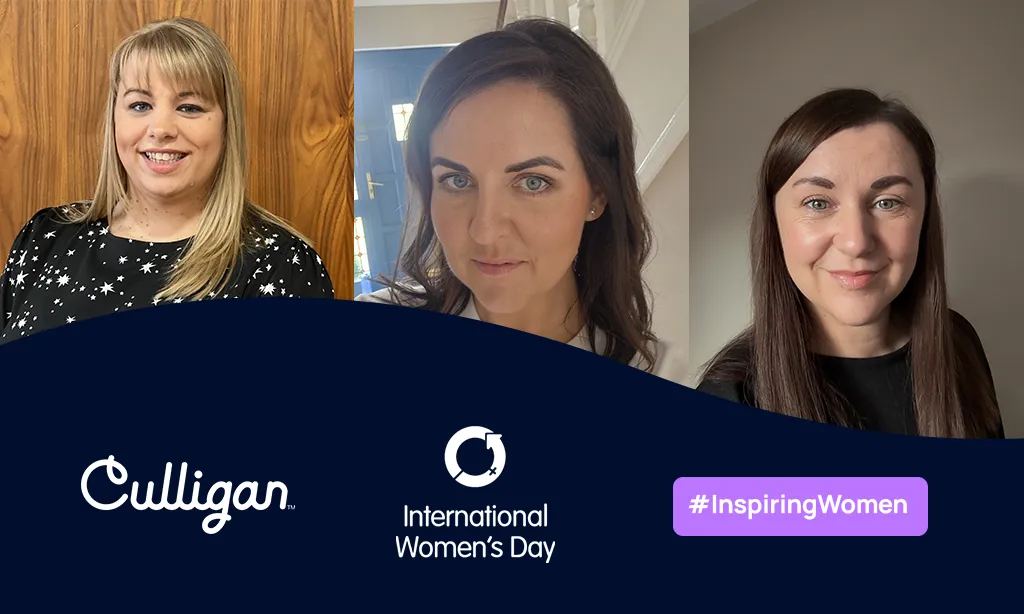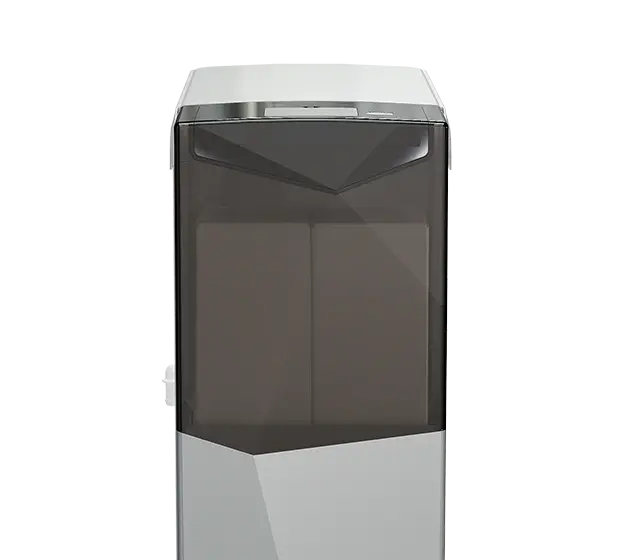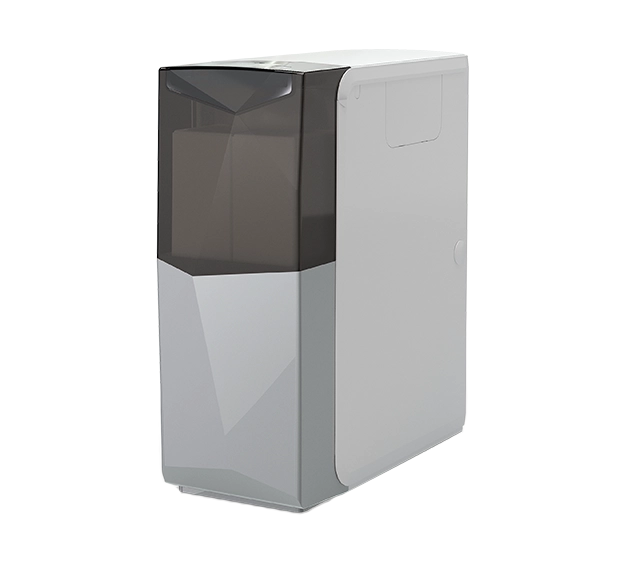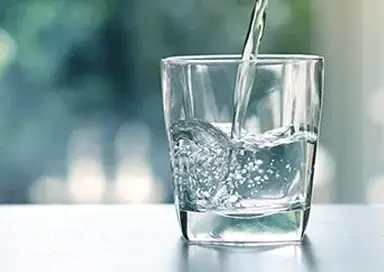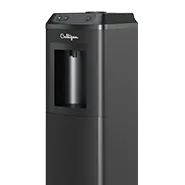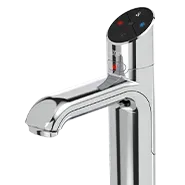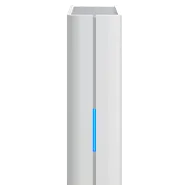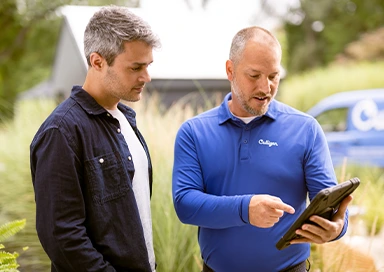Discover our water softeners
Efficient softening for cleaner, softer water for you and your family.
Why choose a Culligan water softener?
benefits for your household.
Extend lifespan of your appliances
Culligan water softeners prevent limescale buildup in appliances, like water heaters and dishwashers, increasing their efficiency and longevity.
This not only saves you money on repairs and replacements but also reduces energy consumption, contributing to a greener home.
Reducing the need for harsh descaling chemicals promotes a safer and more eco-friendly household.

Save on household bills
Having a Culligan water softener in your home can lead to significant cost savings in several ways:
Firstly, it prolongs the lifespan of your appliances by preventing limescale buildup, reducing the need for repairs or replacements. This not only saves on maintenance costs but also lowers energy consumption, translating into reduced utility bills.
Additionally, the decreased reliance on soap and detergents for cleaning results in fewer purchases and contributes to a more budget-friendly household.
Overall, a water softener proves to be a sound investment that pays off over time, offering both financial and operational advantages in your home.

Skin and hair benefits
Your skin’s well-being is crucial, impacting your overall health. Scientific research has linked hard water to skin issues, making a water softener a smart investment for healthier skin.
Softened water is gentler on your skin and hair, preventing dryness and irritation. It can also help in maintaining the vibrancy of your hair colour and reducing the need for moisturisers.
Softer water can help ease conditions like eczema and reduce the likelihood of developing hard water-related skin issues, promoting healthier, more radiant skin.

Effortless cleaning
Soft water minimizes mineral buildup on sinks, showers, and fixtures, making cleaning faster and more straightforward.
Surfaces stay sparkling, requiring less effort and fewer cleaning products, which simplifies household chores and keeps your home looking its best.
This not only saves you time but also reduces the need for expensive cleaning supplies, contributing to your overall cost savings.
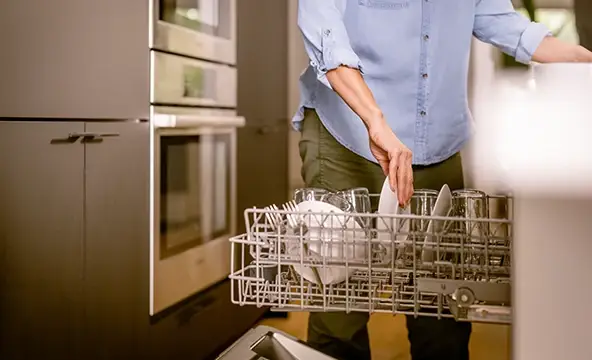
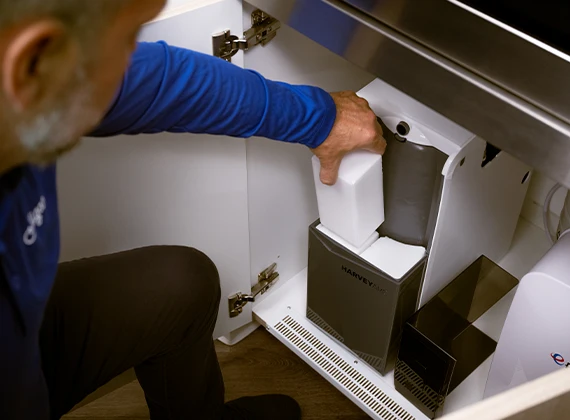
How to choose a softener?
When selecting a water softener, ensure it holds a sanitary conformity certificate like Culligan’s, assuring its suitability for human consumption.
Your choice depends on various factors including your home type, location, size, and potential savings.
To make an informed decision, assess your water’s hardness. Schedule a complimentary in-home water analysis with a Culligan expert to determine the ideal softener for your consumption and installation needs.
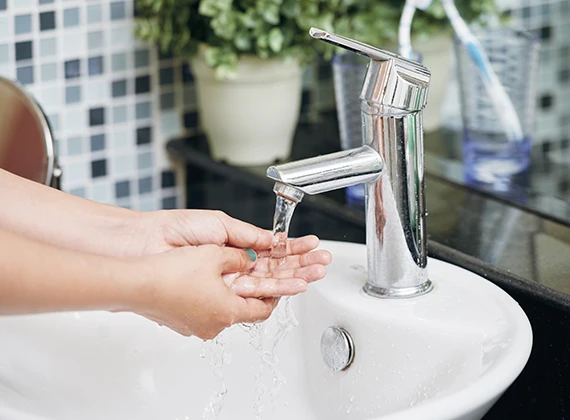
How does a water softener work?
Culligan water softeners use ion exchange to remove calcium and magnesium, turning hard water into soft water.
Resin beads charged with sodium ions remove calcium and magnesium ions (hardness minerals) from incoming water. As hard water passes through the resin tank, the resin beads attract the calcium and magnesium ions, releasing sodium ions into the water, making it soft.
When the resin beads become saturated, a regeneration process with a salt solution replenishes the sodium ions on the beads, allowing them to continue softening the water.
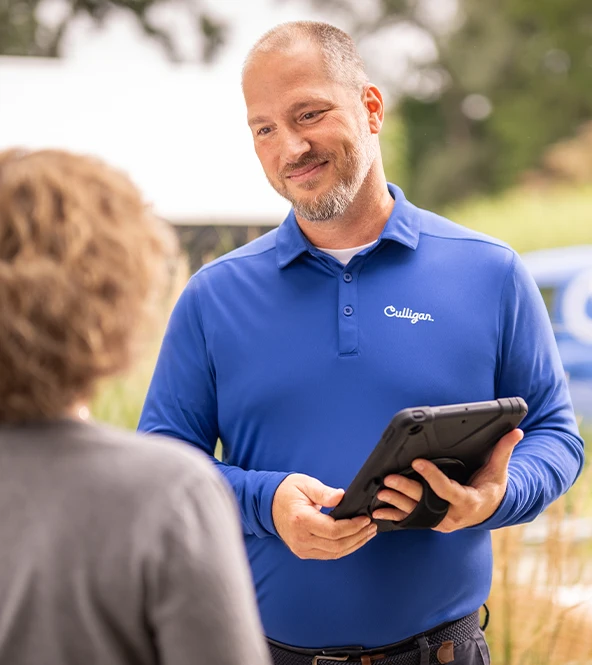
A professional service you can trust.

Reduce your ecological impact and save money
A water softener reduces your ecological impact and saves money by promoting energy efficiency.
Soft water heats up more effectively, lowering energy consumption for heating. It also extends the lifespan of appliances by preventing limescale buildup, reducing the need for costly replacements.
Soft water requires less soap and detergent, which means lower bills, and less environmental impact.
Frequently asked questions
Prior to scheduling an installation, a Culligan expert will conduct a virtual or in-person visit to demonstrate our services. This includes evaluating your home, discussing potential locations for the water softener, and addressing any unique installation considerations. They will also identify any unusual plumbing or water system features to ensure the installation of your water softener can be accommodated.
Hard water contains high levels of minerals like calcium and magnesium. You can often tell you have hard water if you notice limescale buildup on taps and appliances, soap scum in your shower, or if your water doesn't lather well. Contact us for a free consultation where we will analyse the quality of your water and test for hardness.
The right water softener depends on factors like your water hardness level, household size, and water usage. It's best to have a water analysis done by a Culligan professional and we can consult to determine your specific needs.
While some DIY installations are possible, it's recommended to have a professional install your water softener. This ensures it's done correctly and complies with local plumbing codes. A professional can also assess your specific needs for the best results. Contact us about our professional installation service.
Typically, water softeners require maintenance like adding salt to the salt tank and occasional resin bed cleaning. The frequency depends on your water hardness and usage but is usually every done annually. Contact us about our maintenance service for water softeners.
Water softeners primarily remove minerals that cause hardness but don't significantly impact the taste of water. However, some people prefer the taste of softened water, while others opt for a bypass valve to keep one tap with untreated water for drinking.
Water softeners are designed to remove hardness minerals, not other contaminants like chlorine or bacteria. For comprehensive water treatment, consider additional filtration or purification systems, such as Culligan's water filtration systems, or range of water coolers for homes.
Water passes through the internal cylinder of the softener unit where high-quality resin beads collect the hard water salts. The softened water is then passed back into the system for use around the house. After a period of time, the resin beads become full and must be regenerated, this is done automatically. A brine solution is drawn up from the tank and passed over the resin beads in the cylinder during a backwash. This releases the hard water salts which are then flushed away leaving the resin ready to begin its collection again. The regeneration process is fully automatic and takes place late at night when there is no soft water requirement.
It depends on how often your system needs to regenerate. The more your softener regenerates the more salt you will consume. Generally, you will add salt to your brine tank about every 6-8 weeks.
Installation of the water softener is covered in our package. Our engineer would bring all the necessary equipment, tools, and accessories needed for installation. The process itself should take anywhere between 2-3 hours including all the plumbing work. The engineer would then set the settings on the digital meter and complete the installation process.
Installation of the water softener is covered in our package. Our engineer would bring all the necessary equipment, tools, and accessories needed for installation. The process itself should take anywhere between 2-3 hours including all the plumbing work. The engineer would then set the settings on the digital meter and complete the installation process.
You may also be interested in...
Everything you need to provide pure, high-quality water in your home.
Latest news & articles
